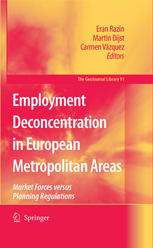

Most ebook files are in PDF format, so you can easily read them using various software such as Foxit Reader or directly on the Google Chrome browser.
Some ebook files are released by publishers in other formats such as .awz, .mobi, .epub, .fb2, etc. You may need to install specific software to read these formats on mobile/PC, such as Calibre.
Please read the tutorial at this link: https://ebookbell.com/faq
We offer FREE conversion to the popular formats you request; however, this may take some time. Therefore, right after payment, please email us, and we will try to provide the service as quickly as possible.
For some exceptional file formats or broken links (if any), please refrain from opening any disputes. Instead, email us first, and we will try to assist within a maximum of 6 hours.
EbookBell Team

5.0
38 reviewsSpatial deconcentration of economic activities, particularly the growth of suburban office, retail and entertainment concentrations, has become a prime concern in European metropolitan areas. This book provides a cross-national comparative perspective on employment deconcentration within selected metropolitan areas in Europe. Whereas most debate over urban sprawl and deconcentration is oriented towards the North American context, this book aims at a better understanding of this phenomenon in the European context, emphasizing the location of economic activities rather than residential patterns. It provides insights on whether different governance attributes produce particular forms of deconcentration versus the influence of market attributes and local specificities, also commenting on quality of life impacts and possible governance and policy implications of the deconcentration process.
Introduction of a comparative framework is followed by eight case study chapters, three representing northern Europe, three the southern European-Mediterranean region and two post-communist central Europe. Most chapters examine two metropolitan areas, usually a large one and a smaller one. The comparison reveals considerable variations in the magnitude, form, and process of employment deconcentration, only partly in line with expected influences of governance systems. Evidence does not fully confirm an anticipated distinction between Northern and Mediterranean Europe; the Czech Republic and Israel seem to diverge most from prevailing European trends.